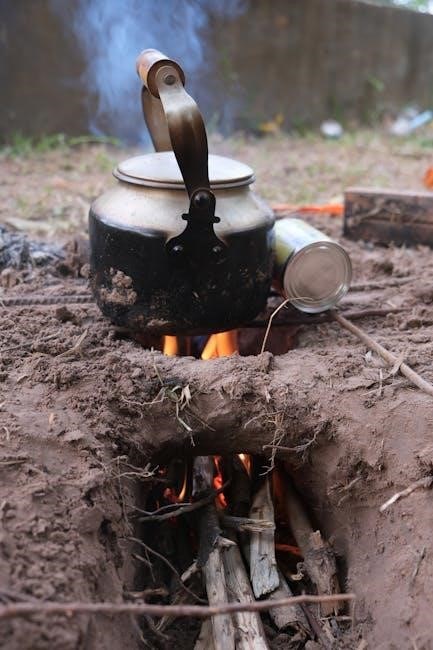A Smoke Alarm Compliance Certificate in Queensland ensures properties meet strict safety standards, legally required for rental properties and property transactions.
What is a Smoke Alarm Compliance Certificate?
A Smoke Alarm Compliance Certificate verifies that a property meets Queensland’s fire safety laws, ensuring smoke alarms are correctly installed and functional. Issued after a professional inspection, it confirms compliance with legislation like the Fire and Emergency Services Act 1990. This certificate is essential for landlords and property sellers, providing proof that smoke alarms meet required standards, such as AS 3786-2014, and are operational at the time of inspection.
Importance of Compliance in Queensland
Compliance with smoke alarm regulations is crucial in Queensland to ensure residential fire safety and protect lives. It is mandated by law to install and maintain smoke alarms in all residential properties, including rental homes and units. Compliance not only prevents fire-related tragedies but also safeguards property owners from legal repercussions. Tenants and landlords alike benefit from a safer living environment, making compliance a shared responsibility enforced by Queensland’s fire safety laws and regulations.
Legal Requirements for Smoke Alarms in QLD
Queensland mandates strict smoke alarm regulations under AS 3786-2014, requiring installation in all residential properties. Compliance is legally necessary for fire safety and to avoid penalties.
Smoke Alarm Regulations for Rental Properties
In Queensland, rental properties must comply with strict smoke alarm regulations. Landlords are legally required to ensure smoke alarms are installed on every storey of the rental property and in areas used for living. Alarms must meet AS 3786-2014 standards and be functioning properly. Non-compliance can result in significant penalties. Regular testing and maintenance are mandatory, and landlords must provide a compliance certificate to tenants. Failure to adhere to these regulations can lead to legal consequences and fines, emphasizing the importance of proper smoke alarm installation and maintenance.
Installation Standards and Types of Properties
Smoke alarms in Queensland must be installed according to AS 3786-2014 standards, ensuring proper placement and functionality. Alarms are required in all bedrooms and hallways of residential properties. For rental properties, alarms must be hardwired and interconnected where possible. Heritage properties and certain exemptions may have specific installation requirements. Compliance ensures safety and avoids penalties, making it essential for landlords to adhere to these standards for all types of properties, including residential and commercial spaces.
Obtaining the Compliance Certificate
A Smoke Alarm Compliance Certificate is issued after a qualified inspector verifies that all smoke alarms meet Queensland’s safety standards and legal requirements.
Who Can Issue the Certificate?
In Queensland, a Smoke Alarm Compliance Certificate can only be issued by a licensed electrician or a qualified fire safety professional. These individuals must adhere to the Australian Standard AS 3786-2014 and ensure all smoke alarms meet the required installation and functionality standards. The certificate is only valid if issued by an authorized professional, ensuring compliance with state fire safety regulations. Property owners must verify the issuer’s credentials to avoid non-compliance penalties. The certificate remains valid for one year from the date of issuance.
Steps to Obtain Certification
To obtain a Smoke Alarm Compliance Certificate in Queensland, property owners must hire a licensed electrician or fire safety professional. The process begins with scheduling an inspection to ensure all smoke alarms meet AS 3786-2014 standards. During the inspection, the professional will verify alarm types, locations, and functionality. Once compliant, they will complete the certification form, which includes details about the property and smoke alarm systems. The certificate is then issued, valid for one year, and must be renewed annually or upon any system changes.
Smoke Alarm Standards and Grades
Smoke alarms in QLD must comply with Australian Standard AS 3786-2014, ensuring reliability and effectiveness. Grades determine suitability based on property type and specific fire safety requirements.
Australian Standard AS 3786-2014
The Australian Standard AS 3786-2014 outlines requirements for smoke alarm installation, testing, and maintenance in residential properties. It ensures smoke alarms meet safety and reliability benchmarks, addressing battery types, placement, and interconnected systems. Compliance with this standard is crucial for QLD properties to pass inspections and obtain the necessary certification. Regular testing procedures, such as monthly button tests and annual professional inspections, are mandated to ensure functionality and protect occupants effectively.
Understanding Smoke Alarm Grades
Smoke alarms are classified into grades based on their performance and suitability for different properties. Grade A alarms are photoelectric and excel in detecting smoldering fires, while Grade B alarms are ionization-based, better for flaming fires. Understanding these grades helps property owners select the right alarms for compliance. Higher grades often meet stricter safety standards, ensuring better protection. Proper grading ensures alarms function effectively, meeting Queensland’s legal requirements for residential and rental properties, thus safeguarding lives and property from fire hazards.
Maintenance and Testing Requirements
Regular testing and maintenance ensure smoke alarms function correctly. Monthly button tests and annual professional inspections are essential. Cleaning devices and replacing batteries maintain reliability, ensuring compliance with safety standards.
Monthly Testing Procedures
Homeowners and tenants must test smoke alarms monthly by pressing the test button to ensure proper function. Listen for three clear beeps, indicating the alarm is working. If no sound is detected, replace the battery or inspect for faults. Additionally, vacuum or clean the alarm to remove dust, ensuring sensors operate effectively. Regular testing helps maintain compliance with QLD safety standards and ensures early fire detection, safeguarding lives and property from potential hazards.
Annual Professional Inspections
Annual professional inspections are mandatory to ensure smoke alarms meet QLD compliance standards. Licensed professionals verify proper installation, functionality, and battery health. Inspections also check for damage, wear, and tear, ensuring alarms remain reliable. This process confirms compliance with AS 3786-2014 standards, providing a detailed report for landlords and property owners. Regular inspections are critical for maintaining fire safety and ensuring alarms function correctly during emergencies.
Common Non-Compliance Issues
Incorrect installation practices and inadequate smoke alarm coverage are leading causes of non-compliance with QLD regulations, often resulting in failed inspections and potential penalties for property owners.
Incorrect Installation Practices
Incorrect installation practices, such as placing smoke alarms too close to fans or in areas with obstructed airflow, are common issues leading to non-compliance. Alarms installed near kitchens or bathrooms may also fail inspections due to excessive false alarms. Additionally, failure to install alarms on every required level or in all bedrooms, as mandated by QLD regulations, is a frequent oversight. Using non-compliant devices or not securing alarms properly further exacerbates compliance failures, risking fines and legal consequences for property owners. Regular maintenance and professional installation are critical to avoiding these pitfalls.
Inadequate Smoke Alarm Coverage
Inadequate smoke alarm coverage is a significant compliance issue, often resulting from insufficient alarms or improper placement. Properties must have alarms installed on every level and in all bedrooms, as per QLD regulations. Failure to ensure comprehensive coverage can lead to non-compliance, posing serious safety risks and potential fines. Property owners must address gaps in coverage by installing additional alarms or relocating existing ones to meet legal requirements and protect occupants effectively. Professional assessments are recommended to verify adequate coverage.
Fines and Penalties for Non-Compliance
Non-compliance with QLD smoke alarm regulations can result in substantial fines and legal penalties, emphasizing the importance of obtaining and maintaining a valid compliance certificate.
Consequences of Non-Compliance
Failure to comply with QLD smoke alarm regulations exposes property owners to legal risks, including fines and penalties. Non-compliance can lead to invalidated property sales, as certificates are often required for settlement. Additionally, insurance claims may be denied if alarms are not properly certified, leaving property owners financially vulnerable. Legal action from tenants or authorities is also possible, emphasizing the importance of adhering to compliance standards to avoid these severe repercussions.
Cost of Smoke Alarm Compliance Certificate
The cost varies based on property size and alarm types, ranging from $150 to $300 for a standard certificate in Queensland.
Average Cost in Queensland
The average cost for a smoke alarm compliance certificate in Queensland typically ranges between $150 and $300. Factors influencing the cost include property size, number of smoke alarms, and installation complexity. Hardwired systems generally cost more than battery-operated ones. Prices may also vary depending on the service provider and additional safety measures required. It’s essential to consult licensed professionals to ensure compliance with Queensland’s specific regulations and safety standards for accurate pricing and reliable service.
Validity Period of the Certificate
The Smoke Alarm Compliance Certificate in Queensland is valid for one year from the date of issue, requiring annual inspections to maintain compliance.
How Long is the Certificate Valid?
The Smoke Alarm Compliance Certificate in Queensland is typically valid for 12 months from the date of issuance. After this period, the property must undergo a new inspection to ensure ongoing compliance with safety standards. Property owners are responsible for scheduling annual inspections to maintain the certificate’s validity. Failure to renew the certificate can result in non-compliance issues, potentially leading to penalties. The 12-month validity ensures that smoke alarms remain functional and meet current safety regulations, providing continued protection for occupants.

Importance in the Event of a Fire
A Smoke Alarm Compliance Certificate serves as proof that smoke alarms meet legal standards, providing legal protection and verifying a property’s safety measures in case of fire incidents.
Role of the Certificate in Fire Incidents
The certificate verifies smoke alarms meet safety standards, ensuring early detection of fires. In fire incidents, it serves as legal proof of compliance, protecting property owners from liability claims and demonstrating adherence to fire safety regulations. This documentation is crucial for insurance purposes and ensures occupants’ safety, highlighting the certificate’s essential role in preventing and managing fire-related risks effectively.
Landlord Responsibilities
Landlords must ensure smoke alarms are installed, maintained, and tested regularly to meet QLD compliance standards, providing a safe environment for tenants and avoiding legal penalties.
Duties of Property Owners
Property owners must install smoke alarms in compliance with QLD legislation, ensuring they meet Australian Standard AS 3786-2014. Regular testing and maintenance are required to guarantee functionality. Owners must keep records of inspections and tests, providing compliance certificates during property sales or transfers. Failure to comply can result in legal penalties, emphasizing the importance of adhering to these regulations to ensure tenant safety and avoid financial repercussions.
Significance When Selling a Property
A Smoke Alarm Compliance Certificate is essential for property sales in QLD, ensuring legal requirements are met and preventing settlement delays or penalties.
Necessity for Property Settlement
A Smoke Alarm Compliance Certificate is crucial for property settlements in Queensland, as it verifies that smoke alarms meet legal requirements. This document ensures safety standards are upheld, protecting buyers and sellers. Without it, property transactions can face delays or penalties. The certificate serves as proof of compliance, simplifying the settlement process. It is a legal prerequisite, ensuring all parties are safeguarded and requirements are fulfilled before ownership transfer.
Sample Smoke Alarm Compliance Certificate
A sample certificate outlines the property address, date, number of alarms, testing details, and compliance standards met, ensuring clarity for property owners and authorities.
Overview of the Document
The Smoke Alarm Compliance Certificate in QLD is a formal document verifying that a property meets all legal smoke alarm requirements. It includes details like the property address, number of alarms installed, their locations, testing results, and compliance with Australian Standard AS 3786-2014. The certificate also lists the issuer’s credentials and the date of inspection. This document is essential for property owners, landlords, and buyers to ensure legal compliance and fire safety standards are upheld in Queensland.
Digital vs. Hard Copy Certificates
Digital certificates offer convenience and easy accessibility, while hard copies provide physical proof. Both are accepted in QLD, catering to different preferences and legal requirements.
Acceptance in Queensland
In Queensland, both digital and hard copy smoke alarm compliance certificates are widely accepted. Digital certificates are increasingly preferred due to their ease of storage and sharing via email. Hard copies remain popular for their tangible proof and legal assurance. Authorities and property managers accept both formats, ensuring flexibility for landlords and property owners. The shift toward digital documentation aligns with modern record-keeping practices, while hard copies continue to serve traditional needs. Both formats must adhere to Queensland’s strict compliance standards.

Fire Safety Standards
Queensland fire safety standards require smoke alarms to meet strict compliance under AS 3786-2014, ensuring early detection and saving lives through regular inspections and maintenance.
AS 5839-2015 Compliance
AS 5839-2015 outlines British standards for fire alarm systems, but in Queensland, compliance primarily follows Australian Standard AS 3786-2014. This ensures smoke alarms are installed, maintained, and tested to provide early fire detection. Proper installation by certified professionals is crucial, with annual inspections and monthly testing required to maintain compliance. Non-compliance can result in penalties, emphasizing the importance of adhering to these standards for safety and legal requirements.
Legal Protection
A Smoke Alarm Compliance Certificate provides legal protection for landlords and tenants by verifying adherence to safety regulations, ensuring accountability and minimizing risks of non-compliance penalties.
Protection for Landlords and Tenants
A Smoke Alarm Compliance Certificate safeguards landlords by verifying legal adherence, reducing liability risks, and providing proof of regulatory fulfillment. For tenants, it ensures a safe living environment by confirming smoke alarms meet required standards. This certification minimizes disputes and demonstrates accountability, protecting both parties in case of fire incidents or legal actions. Regular compliance checks also prevent potential penalties, fostering a secure and legally sound rental relationship.

Local Council Requirements
Local councils in Queensland enforce specific smoke alarm regulations, varying by region, ensuring compliance with safety standards tailored to community needs and risk assessments.
Variances Across Councils
Different councils in Queensland may have unique requirements for smoke alarm compliance certificates, reflecting local fire risks and property types. Some councils require additional inspections or specific documentation, while others may enforce stricter installation standards. Property owners must consult their local council to ensure compliance, as failure to meet specific regional regulations can result in penalties. These variances highlight the importance of understanding local fire safety guidelines when obtaining a compliance certificate.

Comparison with Other States
Queensland’s smoke alarm compliance requirements differ from other states, with varying standards for installation, types, and maintenance, reflecting regional fire safety priorities and legal frameworks.
QLD vs. Other Australian States
Queensland’s smoke alarm compliance requirements are among the strictest in Australia, differing significantly from other states. While NSW and Victoria share similar mandatory installation standards, QLD enforces unique testing and maintenance protocols. For instance, QLD requires smoke alarms on every level of rental properties, whereas other states may have less stringent placement rules. Additionally, QLD’s compliance certificate process is more detailed, ensuring adherence to AS 3786-2014 standards. Other states, like Western Australia, may have varying enforcement levels, but QLD’s focus on rental properties and annual inspections sets it apart. Each state tailors its approach to local fire safety needs and legislative frameworks.
Ensuring smoke alarm compliance is crucial for safety and legal requirements in QLD. The state’s stringent standards differ from other regions, emphasizing property protection. Compliance certificates are vital for transactions and rentals, safeguarding landlords and tenants. Adhering to AS 3786-2014 and regular maintenance prevents fines and ensures safety.
Final Thoughts on Compliance
Smoke alarm compliance in QLD is non-negotiable, ensuring safety and legal adherence. Property owners must prioritize installations and regular checks. Non-compliance risks fines and liability, making adherence crucial. Obtain certificates from licensed professionals to avoid penalties. Stay updated on regulations to protect lives and properties. Compliance is not just a legal requirement but a lifesaver.

